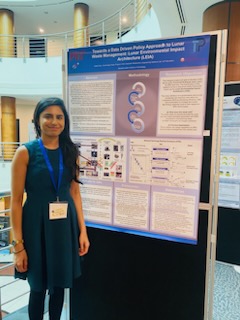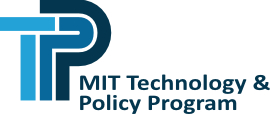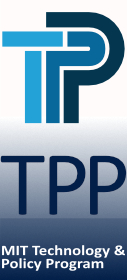
Taking out the moon trash
Nadia Khan is a second year TPP candidate. She works in the Engineering Systems Lab at MIT’s Department of Aeronautics and Astronautics as a Graduate Research Assistant. Here, her research is focused on the NASA funded Advanced Space Technology Roadmapping Architecture (ASTRA) project. Nadia’s TPP thesis research is on lunar waste management. As part of this work, she presented her findings from her research at the 5th COSPAR Symposium in Singapore.
What is the focus of your research?
My research focuses on lunar waste management. I look at how a data-driven approach to policy making on the issue of lunar waste mitigation can help private companies and spacefaring nations to adopt cleaner in-situ-resource utilization (ISRU) processes to minimize their waste product output and maximize their desired product outputs. The end goal of my research is to produce a lunar architectures framework that can be used by commercial entities and spacefaring nations.
What sort of knowledge and disciplines did it bring together? How can it make an impact?
This is an inter and multi-disciplinary project that requires big picture systems level thinking. My research focuses on microeconomics, geology, space systems engineering, and space law. Through my research, I hope to demonstrate that a policy solution on this topic requires expertise and coordination drawn from all these disciplines.
Why did you choose to come to TPP?
I chose TPP because the curriculum offered in this program is perfectly suited to the type of interdisciplinary research that I am conducting through my thesis. The skills that I have learned from the program so far have helped me immensely to work with experts from a variety of fields to raise awareness about this important topic.
You presented at the 5th COSPAR Symposium in Singapore. Tell us about your presentation!
My presentation details the steps that I am taking to develop a data driven approach to policy making on the topic of lunar waste management. In my presentation, I address the four strategic gaps that need to be addressed in order to develop a durable policy framework on lunar waste management. My presentation delved deeper into the Technology Readiness Level (TRL), Data scarcity, inefficiency in ISRU benefaction process, and the lack of coordination that currently exists between space faring nations and commercial entities. I enjoyed hearing the perspectives of small satellite experts on the matter of lunar waste management. The symposium helped me to address important questions in my research methodology.
What was a highlight of the conference?
The highlight of the conference was the IDEA Plenary Session entitled: Promotion of Women in Engineering, Research, and Science (POWERS): Addressing Challenges for Girls in STEM. During the session, we heard from leaders such as Deputy Chief Technologist (DCT) for NASA’s Science Mission Directorate (SMD) Florence Tan. The discussion panelists shared how leaders within the industry can mentor women and minorities to help them reach their goals.
My participation in the COSPAR 2023 Symposium would not be possible without the generous support of the MIT Center for International Studies (CIS), through which I was awarded the CIS/Starr Student Travel Fellowship. I would also like to thank ESL Administrator Dr. Shokofeh Khadivi and Assistant Dean from the Office of Graduate Education (OGE) Elizabeth Guttenberg for their continued support with my studies. And finally, I would like to thank my two thesis advisors for supporting my research goals: professors Oli de Weck (IDSS & Aero/Astro) and Martin Elvis, senior astrophysicist for the Harvard Center for Astrophysics at the Harvard Smithsonian.


